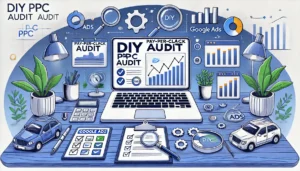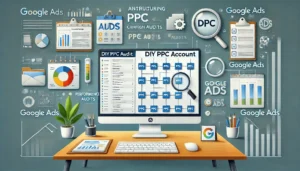Is Your PPC Leaking Cash? A Free Guide to DIY PPC Audits for UK Businesses

In today’s digital world, businesses in the UK are increasingly relying on pay-per-click (PPC) advertising to reach their customers. However, without regular checks and balances, it’s easy for these campaigns to start wasting money. This guide is designed to help you understand how to conduct a DIY PPC audit, ensuring your campaigns are effective and cost-efficient. Here, we will break down the process into manageable steps, making it accessible for everyone, regardless of their technical background.
Key Takeaways
- A PPC audit helps you find and fix problems in your ad campaigns.
- Regular audits are crucial to prevent wasted spending and improve results.
- Setting clear goals ensures your PPC efforts align with your business needs.
- Using the right tools can simplify the analysis of your PPC account.
- Staying updated on PPC policies is essential to avoid compliance issues.
A Free Guide to DIY PPC Audits: Understanding the Basics
What is a PPC Audit?
A PPC audit is a thorough examination of our pay-per-click advertising campaigns. It helps us identify areas that need improvement. By conducting a Google ads audit, we can ensure that our ads are performing at their best. This process involves checking various elements, such as keywords, ad copy, and budget allocation.
Why Regular Audits are Essential (A Free Guide to DIY PPC Audits)
Regular audits are crucial for maintaining the effectiveness of our PPC campaigns. They allow us to:
- Spot inefficiencies in our spending.
- Adjust our strategies based on performance data.
- Stay ahead of competitors by optimising our ads.
In short, regular audits help us save money and improve results.
Common PPC Mistakes to Avoid
When managing PPC campaigns, we often make mistakes that can cost us money. Here are some common pitfalls:
- Ignoring negative keywords, which can lead to wasted clicks.
- Not tracking conversions, making it hard to measure success.
- Failing to update ad copy regularly, which can lead to ad fatigue.
Regularly reviewing our campaigns can help us avoid these mistakes and maximise our return on investment.
By understanding the basics of PPC audits, we can take the first step towards improving our advertising efforts and ensuring that our budgets are not leaking cash.
A Free Guide to DIY PPC Audits: Identifying Your PPC Goals and Objectives
Setting Clear PPC Goals
To start, we need to set clear goals for our PPC campaigns. This helps us understand what we want to achieve. Here are some common goals:
- Increase website traffic
- Generate more leads
- Boost sales
By defining our goals, we can measure our success more effectively.
Aligning PPC with Business Objectives (A Free Guide to DIY PPC Audits)
Next, it’s crucial to align our PPC goals with our overall business objectives. This ensures that our advertising efforts support our broader aims. For example, if our business goal is to expand into a new market, our PPC campaigns should target that specific audience.
Measuring Success in PPC Campaigns
Finally, we must measure the success of our PPC campaigns. We can do this by tracking key performance indicators (KPIs) such as:
- Click-through rate (CTR)
- Conversion rate
- Return on ad spend (ROAS)
By regularly reviewing these metrics, we can adjust our strategies as needed.
Remember, a well-defined goal is the first step towards a successful PPC campaign.
In summary, identifying our PPC goals and objectives is essential for effective advertising. With the right focus, we can avoid common pitfalls and ensure our campaigns are successful.
A Free Guide to DIY PPC Audits: Analysing Your PPC Account Structure
Importance of a Well-Organised Account
A well-structured PPC account is crucial for success. It helps us manage campaigns effectively and track performance easily. When our account is organised, we can quickly identify areas that need improvement. Here are some key benefits of a well-organised account:
- Easier to manage campaigns
- Better tracking of performance
- Quick identification of issues
How to Structure Campaigns Effectively (A Free Guide to DIY PPC Audits)
When structuring our campaigns, we should consider the following:
- Group similar keywords together.
- Create separate campaigns for different products or services.
- Use clear naming conventions for easy identification.
By following these steps, we can ensure our campaigns are set up for success. A PPC ecommerce agency can also provide valuable insights into effective structuring.
Tools for Analysing Account Structure
To analyse our account structure, we can use various tools. Some popular options include:
- Google Ads Editor
- SEMrush
- WordStream
These tools help us evaluate our account and make necessary adjustments.
A well-organised PPC account can save us time and money, allowing us to focus on what truly matters: driving conversions and maximising ROI. Remember, common mistakes in calculating Google Ads ROI can lead to wasted resources, so we must stay vigilant!
A Free Guide to DIY PPC Audits: Evaluating Keyword Performance
Choosing the Right Keywords
When we think about our PPC campaigns, selecting the right keywords is crucial. These keywords are the terms our potential customers are searching for. We should focus on:
- Relevance: Ensure the keywords relate to our products or services.
- Search Volume: Look for keywords that many people are searching for.
- Competition: Consider how many others are bidding on these keywords.
Using Negative Keywords Effectively (A Free Guide to DIY PPC Audits)
Negative keywords help us avoid showing our ads for irrelevant searches. This can save us money and improve our click-through rates. We should regularly review and update our negative keyword list to ensure we’re not wasting our budget on unqualified traffic.
Monitoring Keyword Performance
Regularly checking how our keywords are performing is essential. We can track metrics like:
- Click-Through Rate (CTR)
- Conversion Rate
- Cost Per Click (CPC)
By analysing these metrics, we can make informed decisions about which keywords to keep, pause, or remove.
In the world of PPC, leveraging data to fuel growth is key. By understanding our keyword performance, we can make better decisions and drive more effective campaigns.
A Free Guide to DIY PPC Audits: Improving Ad Copy and Creative
Crafting Compelling Ad Copy
Creating effective ad copy is crucial for attracting potential customers. We need to focus on clarity and engagement. A strong headline can make all the difference. Here are some tips to consider:
- Use clear and concise language.
- Highlight unique selling points.
- Include a strong call to action.
A/B Testing Your Ads (A Free Guide to DIY PPC Audits)
Testing different versions of our ads helps us understand what works best. A/B testing allows us to compare two versions and see which one performs better. We should consider:
- Changing headlines.
- Altering images or visuals.
- Modifying the call to action.
Utilising Ad Extensions
Ad extensions can enhance our ads by providing additional information. They can improve click-through rates and make our ads more appealing. Some useful ad extensions include:
- Sitelink extensions to direct users to specific pages.
- Call extensions for easy contact.
- Location extensions to show our business address.
In the world of PPC, ad copy is our first impression. We must make it count!
A Free Guide to DIY PPC Audits: Optimising Landing Pages for Better Conversion
Elements of a High-Converting Landing Page
To create a landing page that converts well, we need to focus on several key elements. These include:
- Clear and Compelling Headline: This is the first thing visitors see, so it must grab their attention.
- Engaging Visuals: Use images or videos that relate to your offer.
- Strong Call-to-Action (CTA): Make it easy for visitors to know what to do next.
Testing and Improving Landing Page Performance (A Free Guide to DIY PPC Audits)
We should always be testing our landing pages. A/B testing is a great way to see what works best. Here are some steps we can take:
- Change one element at a time, like the headline or CTA.
- Track how each version performs.
- Use the data to make informed decisions.
Ensuring Mobile-Friendliness
In today’s world, many people browse on their phones. Therefore, our landing pages must be mobile-friendly. This means:
- Fast loading times
- Easy navigation
- Clear and readable text
A well-optimised landing page can significantly boost our conversion rates. By focusing on these elements, we can turn more visitors into customers.
In summary, optimising landing pages is crucial for our PPC success. We must ensure they are engaging, tested, and mobile-friendly to achieve the best results. Remember, a great landing page can make all the difference in our PPC performance and overall success.
A Free Guide to DIY PPC Audits: Budget Management and Bid Strategies
Setting a Realistic PPC Budget
When we start with PPC, it’s crucial to set a budget that makes sense for our business. A well-planned budget helps us avoid overspending and ensures we get the most out of our campaigns. Here are some steps to consider:
- Determine your overall marketing budget.
- Identify how much you can allocate specifically for PPC.
- Monitor and adjust your budget based on performance.
Understanding Bid Strategies (A Free Guide to DIY PPC Audits)
Bid strategies are the methods we use to determine how much we’re willing to pay for clicks. Choosing the right strategy can significantly impact our campaign’s success. Here are some common strategies:
- Manual CPC (Cost Per Click)
- Enhanced CPC
- Target CPA (Cost Per Acquisition)
Each strategy has its pros and cons, so it’s essential to choose one that aligns with our goals.
Adjusting Bids for Optimal Performance
To get the best results, we need to regularly adjust our bids. This means looking at how our ads are performing and making changes as needed. Here are some tips:
- Increase bids for high-performing keywords.
- Decrease bids for underperforming keywords.
- Use dayparting to adjust bids based on the time of day.
By managing our budget and bids effectively, we can maximise our PPC results and minimise waste.
In conclusion, understanding our budget and bid strategies is vital for successful PPC campaigns. We should always keep an eye on our spending and adjust our approach as necessary. Remember, brand bidding can be a tricky area, so we must consider our options carefully.
A Free Guide to DIY PPC Audits: Leveraging Analytics and Reporting
Key Metrics to Track in PPC
To make the most of our PPC campaigns, we need to keep an eye on several important metrics. Here are some key ones:
- Click-Through Rate (CTR): This shows how often people click on our ads after seeing them.
- Conversion Rate: This tells us how many clicks lead to actual sales or desired actions.
- Cost Per Click (CPC): This is the amount we pay for each click on our ads.
Using Google Analytics for PPC Insights (A Free Guide to DIY PPC Audits)
Google Analytics is a powerful tool that helps us understand our PPC performance better. By linking our PPC accounts to Google Analytics, we can:
- Track user behaviour on our website.
- See which ads are driving the most traffic.
- Measure the effectiveness of our landing pages.
Regular Reporting and Analysis
Regularly reviewing our PPC performance is crucial. We should create reports that include:
- Summary of key metrics.
- Insights on what’s working and what isn’t.
- Recommendations for future campaigns.
By focusing on analytics, we can make informed decisions that improve our PPC efforts. Understanding our data is key to success.
In summary, leveraging analytics and reporting allows us to refine our strategies and maximise our return on investment. We must remember that data-driven decisions lead to better outcomes.
Additionally, we should not overlook the importance of remarketing strategies. This page from PPC Geeks explains the concept of remarketing in pay-per-click (PPC) advertising. It emphasises the importance of using remarketing strategies to enhance ad performance and reach potential customers who have previously interacted with the brand. The page also offers a free audit for those seeking to improve their PPC campaigns.
A Free Guide to DIY PPC Audits: Exploring Advanced PPC Techniques
Remarketing Strategies
Remarketing is a powerful tool in our PPC arsenal. It allows us to reconnect with users who have previously interacted with our website. By showing targeted ads to these users, we can encourage them to return and complete their purchase. This technique can significantly boost our conversion rates.
Utilising Audience Targeting (A Free Guide to DIY PPC Audits)
Audience targeting helps us reach the right people. We can segment our audience based on their behaviour, interests, and demographics. This way, we ensure that our ads are seen by those most likely to engage with them. Here are some key points to consider:
- Define our target audience clearly.
- Use data to refine our audience segments.
- Test different audience groups to find the best fit.
Incorporating AI in PPC Campaigns
Artificial Intelligence (AI) is changing the game in PPC management. It can help us optimise our campaigns by analysing vast amounts of data quickly. AI tools can suggest bid adjustments, identify trends, and even automate ad placements. This means we can focus more on strategy and less on manual tasks.
In the fast-paced world of ecommerce PPC, staying ahead means embracing new technologies.
By exploring these advanced techniques, we can enhance our PPC efforts and ensure we are not leaking cash. Regularly updating our strategies based on the latest trends, such as those highlighted in the PPC news for October 2023, is essential for maintaining optimal performance.
A Free Guide to DIY PPC Audits: Ensuring Compliance with PPC Policies
Understanding PPC Advertising Policies
When we dive into the world of PPC, we must first grasp the rules that govern it. Adhering to these policies is crucial for our campaigns to succeed. Each platform, like Google Ads or Facebook Ads, has its own set of guidelines. These rules help maintain a fair and safe advertising environment.
Avoiding Common Compliance Issues (A Free Guide to DIY PPC Audits)
To keep our ads running smoothly, we should be aware of common pitfalls. Here are a few to watch out for:
- Misleading content in ads
- Using prohibited keywords or phrases
- Not following image and video guidelines
By steering clear of these issues, we can ensure our ads remain compliant and effective.
Staying Updated with Policy Changes
The digital advertising landscape is always changing. Therefore, we need to stay informed about any updates to PPC policies. Regularly checking the official guidelines can help us avoid unexpected surprises. We can also join communities to share insights and learn from others. This way, we can enhance our knowledge and improve our ad performance together.
Staying compliant is not just about following rules; it’s about building trust with our audience.
In summary, understanding PPC policies, avoiding common mistakes, and staying updated are key steps in ensuring our campaigns are successful and compliant. Let’s work together to make our PPC efforts as effective as possible!
DIY PPC Audits Checklist for UK Businesses
Conducting a PPC audit can seem daunting, but it’s essential for ensuring our campaigns are effective. Here’s a straightforward checklist to guide us through the process:
Step-by-Step Audit Process
- Review Account Structure: Ensure campaigns and ad groups are organised logically. This helps in managing and optimising our ads effectively.
- Evaluate Keyword Performance: Check which keywords are driving traffic and conversions. We should focus on high-performing keywords while eliminating underperformers.
- Assess Ad Copy and Creative: Look at our ad copy. Is it engaging? Does it include a clear call to action? We need to ensure our ads stand out.
- Check Landing Pages: Are our landing pages optimised for conversions? They should be relevant to the ads and provide a seamless user experience.
- Monitor Budget and Bids: Review our spending. Are we sticking to our budget? Adjust bids based on performance to maximise our return on investment.
Tools and Resources for DIY Audits (A Free Guide to DIY PPC Audits)
- Google Ads: For checking ad performance and keyword effectiveness.
- Google Analytics: To track user behaviour and conversions. Remember, understanding conversion tracking is crucial for effective PPC management.
- PPC Audit Tools: Various online tools can help streamline the audit process.
Common Pitfalls and How to Avoid Them
- Ignoring data: Always base our decisions on data rather than assumptions.
- Neglecting mobile optimisation: Ensure our ads and landing pages are mobile-friendly.
- Failing to update: Regularly revisit our PPC strategy to adapt to changes in the market.
Regular audits not only help us save money but also improve our overall PPC performance. By following this checklist, we can ensure our campaigns are running smoothly and effectively.
If you’re a UK business looking to improve your online advertising, our free PPC audit is just what you need! Visit our website to get started and discover how to enhance your PPC campaigns today!
Conclusion
In conclusion, conducting a PPC audit is essential for any UK business looking to maximise its advertising budget. By regularly checking your campaigns, you can spot areas where money might be wasted and make the necessary changes to improve performance. Remember, a well-managed PPC strategy not only saves you money but also helps you reach your target audience more effectively. So, take the time to review your ads, keywords, and overall strategy. With a little effort, you can ensure that your PPC campaigns are working hard for you, rather than leaking cash.
Frequently Asked Questions
What is a PPC audit?
A PPC audit is a check-up for your pay-per-click advertising. It helps you see if your ads are working well and if you’re spending your money wisely.
Why should I do regular PPC audits?
Regular audits help you find problems in your ads and fix them. This way, you can save money and get better results.
What are some common mistakes in PPC?
Common mistakes include not using the right keywords, having poor ad copy, and not tracking your results properly.
How do I set clear goals for my PPC campaigns?
To set clear goals, think about what you want to achieve, like getting more website visitors or sales, and write those goals down.
What tools can help me analyse my PPC account?
There are many tools available, like Google Ads and SEMrush, which can help you look at your account structure and performance.
How can I improve my ad copy?
To make better ad copy, focus on what makes your product special and use clear, simple language that grabs attention.
What should I include on my landing page?
A good landing page should have a clear message, a strong call to action, and be easy to navigate.
How do I track my PPC success?
You can track your success by looking at important numbers like clicks, conversions, and return on investment (ROI).
Author
Search Blog
Free PPC Audit
Subscribe to our Newsletter
The Voices of Our Success: Your Words, Our Pride
Don't just take our word for it. With over 100+ five-star reviews, we let our work-and our satisfied clients-speak for us.
"We have been working with PPC Geeks for around 6 months and have found Mark and the team to be very impressive. Having worked with a few companies in this and similar sectors, I rate PPC Geeks as the strongest I have come across. They have taken time to understand our business, our market and competitors and supported us to devise a strategy to generate business. I value the expertise Mark and his team provide and trust them to make the best recommendations for the long-term."
~ Just Go, Alasdair Anderson




